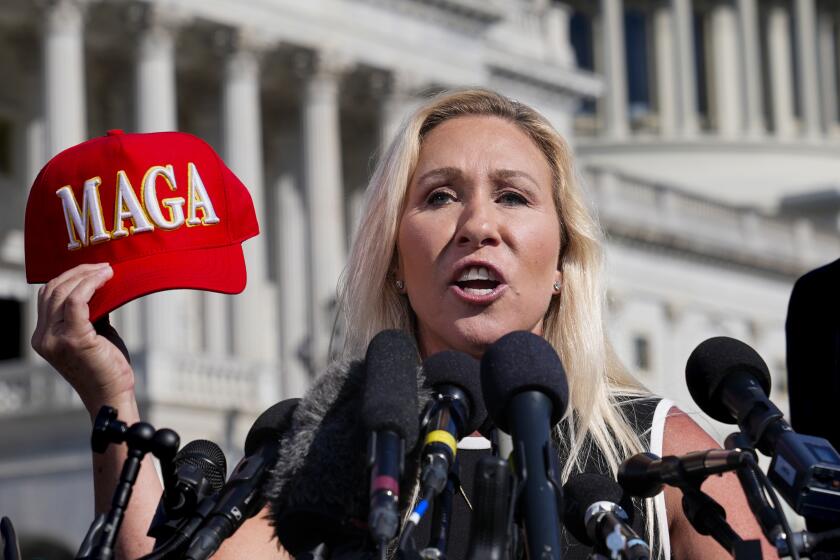Bush Insists on Tools to Fight Terror
President Bush launched a bristling counteroffensive Monday against critics of his domestic anti-terrorism policies, saying it was “inexcusable” for the Senate to delay renewal of the Patriot Act and insisting that his decision to order electronic eavesdropping without court approval was legal and proper.
“In the war on terror, we cannot afford to be without this law for a single moment,” Bush said at a news conference, urging the Senate to extend the expiring provisions of the Patriot Act, which grants the federal government expanded powers to investigate suspected terrorists.
In an unusually personal challenge, he called on Democratic senators from California, Nevada and New York to justify their votes to delay the law’s extension. “I want senators from New York or Los Angeles or Las Vegas to go home and explain why these cities are safer,” Bush said.
Bush’s pugnacious performance in the nearly hourlong news conference seemed a contrast to Sunday evening, when he delivered a televised speech on the war in Iraq that was notable for its conciliatory tone toward his critics.
On Monday, the president was talking not about Iraq, on which his policies are widely unpopular, but about law enforcement measures against suspected terrorists in the United States -- an issue on which he has won, and held, consistent public support.
“There’s an enemy there, and the enemy wants to attack us,” Bush said. “That is why I hope you can feel my passion about the Patriot Act. It is inexcusable to say to the American people, ‘We’re going to be tough on terror,’ but take away the very tools necessary to help fight these people.”
A large majority of senators in both parties want to renew the Patriot Act, but they have disagreed on whether to add provisions that some say would better protect civil liberties. Senate Minority Leader Harry Reid (D-Nev.) and other members of his party have proposed extending the current version of the law for three months to allow more time to negotiate a compromise. Bush and Republican leaders have insisted on an immediate, all-or-nothing vote.
The issue has turned into a high-stakes game of political chicken. Bush and his allies appear prepared to allow the law to lapse after Dec. 31 -- and hope Democrats would be blamed.
“Let’s be clear who is killing the Patriot Act,” Reid said Monday. “The president and the Republican leadership decided they’d rather see the bill expire. Maybe the president has trouble getting away from being campaigner in chief.... But the responsibility for this going up or down is his and no one else’s.”
Reid said he hoped Bush would blink and allow a short-term extension of the act. But Bush and Senate Majority Leader Bill Frist (R-Tenn.) have opposed the idea. Reid cannot force a vote on the Senate floor without Frist’s consent.
The Patriot Act renewal has passed the House, but it was blocked in the Senate last week when four Republicans broke ranks and joined 42 Democrats in a 53-46 vote. Under Senate rules, 60 votes are needed to cut off debate and move to final passage of a bill.
In challenging senators from “New York or Los Angeles or Las Vegas” to explain their votes against renewing the anti-terrorism law, Bush was singling out Democratic lawmakers. Reid is from a small town near Las Vegas. Sens. Hillary Rodham Clinton (D-N.Y.) and Charles E. Schumer (D-N.Y.) both live near New York City. Sens. Dianne Feinstein (D-Calif.) and Barbara Boxer (D-Calif.) are both from the Bay Area, but as statewide legislators they represent Los Angeles.
Senators’ qualms over extending some Patriot Act provisions without more civil liberties protections grew last week after the New York Times disclosed that Bush had secretly authorized the National Security Agency to listen in on the international phone calls of U.S. citizens and legal residents if authorities believed they were linked to terrorist groups.
The secret order touched off a controversy because the government needs court permission before it can eavesdrop on U.S. telephone calls, and because the president said he needed no special authority to order the surveillance.
Sen. Arlen Specter (R-Pa.), chairman of the Senate Judiciary Committee, said the revelation stopped the Patriot Act renewal cold.
“You couldn’t have picked a worse day to defend the Patriot Act than last Friday,” he said. “It was like a cannonball between my eyes.”
Specter said he was trying to break the logjam over the Patriot Act but noted that it was probably impossible to amend the law before the end of the year, because any change would require assent from the House.
“With the House out of session, I do not know how we can alter” the current version of the bill, Specter said.
In his news conference, Bush swatted away questions about his decision to order domestic eavesdropping without court approval, saying that the measures were necessary and legal -- and insisting that they were administered in a manner sensitive to civil liberties.
“Do I have the legal authority to do this? The answer is absolutely,” he said.
“As president and commander in chief, I have the constitutional responsibility and the constitutional authority to protect our country,” he said. “Article II of the Constitution gives me that responsibility and the authority necessary to fulfill it.”
When a reporter asked whether the war on terrorism had brought a “permanent expansion of the unchecked power of the executive,” the president bristled.
“To say ‘unchecked power’ basically is ascribing some kind of dictatorial position to the president, which I strongly reject,” he said. “I am doing what you expect me to do, and at the same time safeguarding the civil liberties of the country.”
He said the program was “carefully reviewed approximately every 45 days to ensure it is being used properly.” But he did not offer any detailed explanation of his authority to order the eavesdropping, or of the administration’s internal review process. His most forceful defense of the surveillance program focused on the argument that it was necessary to prevent terrorist attacks.
“To save American lives, we must be able to act fast and to detect these conversations so we can prevent new attacks,” he said, suggesting that courts could not act quickly enough.
Without revealing details, he said the eavesdropping program had “been effective in disrupting the enemy.” Bush said he had reauthorized the program more than 30 times and would continue doing so “for as long as the nation faces the continuing threat of an enemy that wants to kill American citizens.”
“My personal opinion is it was a shameful act for someone to disclose this very important program in a time of war,” the president said, adding that he presumed the Justice Department would investigate the leak.
The disclosure of the eavesdropping program, Bush said, “is helping the enemy.” As an example of the setbacks that leaks can cause, Bush said the U.S. government in the late 1990s was tracking Saudi-born terrorist Osama bin Laden through transmissions from his cellular telephone. But after media reports revealed the operation, Bin Laden stopped using the phone.
Bush mentioned the incident twice; Stephen Hadley, his national security advisor, and Frances Townsend, his domestic security advisor, seated at the news conference, nodded emphatically.
Bush said his administration would continue to obtain court warrants to wiretap domestic telephone conversations, consistent with the Foreign Intelligence Surveillance Act of 1978, which provides for a judicial panel created by Congress to secretly review and approve surveillance of U.S. suspects in national security cases.
On another matter, Bush conceded that the credibility of U.S. intelligence agencies had probably suffered long-term damage because of their inaccurate assertions that Iraq possessed weapons of mass destruction.
“Where it is going to be most difficult to make the case is in the public arena,” he said. “People will say if we’re trying to make the case on Iran, well, the intelligence failed in Iraq, therefore, how can we trust the intelligence in Iran?”
For now, Bush said, the international efforts to deter Iran from proceeding with a nuclear weapons program would remain within “the councils of government,” adding, “We want this to be solved diplomatically.”
The president’s news conference came after a series of speeches in recent weeks to shore up public support for the war in Iraq. He is scheduled to leave Thursday to spend Christmas at his ranch in Texas.
Times staff writer Doyle McManus contributed to this report.
More to Read
Get the L.A. Times Politics newsletter
Deeply reported insights into legislation, politics and policy from Sacramento, Washington and beyond. In your inbox three times per week.
You may occasionally receive promotional content from the Los Angeles Times.







